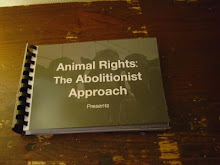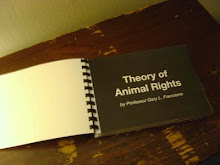Listen HERE
This week I talk about how I personally deal with the accusation that advocates of the abolitionist approach "don't care about animals who are suffering NOW!" For starters, I strongly recommend listening to this debate (there is a link to the audio in the post itself. Please listen):
http://www.abolitionistapproach.com/my-dinner-at-eriks-happy-meat-diner/
and I strongly STRONGLY recommend reading Rain Without Thunder. Please please read this book.
I also talk about how the focus of all our interactions with each other and anyone with whom we are engaging with this issue should remain on the real issue leaving ego and personality out of it. Whether or not you like me is unimportant, it is what I am saying that matters. If you don't like what I am saying, let's talk about that not about whether or not you like my personality. That conversation is an unforgivable waste of both our time. As a wonderful advocate @VeraVeganA said yesterday:
"When ppl call me names & I feel sad, I rapidly focus on nonhumans again & keep on track"
Now that is what I'm talking about Vera!
I also talk about Professor Gary Steiner who did this great interview on Animal World:
Animal World Doctor Gary Steiner: A Vegan Diet is a Moral Obligation
You can download both parts 1 and 2 (scroll down to the bottom of the screen)
Finally I talk about my revamped AUT University Club, here is the website, please let me know what you think (it is still not finished yet). A million thanks to William Paul for all the help.
http://autanimalrights.weebly.com/
Friday, February 26, 2010
Subscribe to:
Post Comments (Atom)












Hi Elizabeth, great podcast as always! I like the insight you gave that perhaps the reason that people who support welfarism and single issue campaigns resort to personal attacks (ie. accusing abolitionists of not "caring" about animals suffering now) because they feel attacked when abolitionists say that welfarism and s.i. campaigns don't work and since they don't have strong logical arguments to offer in return, the tendency is to attack the messenger. Personally, as I'm starting to get in touch with the (mostly single issue and welfare oriented) animal movement in my area, I find it difficult as a newcomer to look someone in the eye and tell them that I don't think their anti-fur campaign is a useful thing to do. They're lovely people who sincerly care about animals, they're very dedicated to what they're doing and have been doing it for a long time, whereas I'm a complete newbie. Many of them seem convinced that what they're doing is working because they have apparently convinced some local restaurants to take foie gras off the menu--to which I am so very tempted to say, "So what? They're still selling every other kind of animal product under the sun, but now they can tell customers they're 'ethical' because they got rid of the f.g., so how is that helping animals? I don't know how to say that without sounding like I'm criticizing them as activists. Or more importantly, how to say it so that they'll listen and take me seriously. Maybe the only thing to do is just say it, and deal with the consequences as best I can. Anyway, this was a great episode and gave me lots to think about.
ReplyDeleteHow do we help animals NOW (the ones that currently exist)? Simple. Direct action.
ReplyDeleteIt's called DIRECT action for a reason!
Animal liberation, be it an ALF liberation or an open rescue, prevents further exploitation of that particular animal, which probably means s/he will never be transported to the slaughterhouse to be killed.
The website is good.
Thanks for the comments!
ReplyDeleteI agree Alexandra that we have no choice but to say it, we must try to do it as objectively as possible, hoping they are able to put aside their feelings and vested interests and look at the facts. It is good to be sensitive to the inevitable emotional response, and helps to relate it to our own, but we have to remind everyone this is really not about us or how WE feel!
Thanks Gordon for your insight on the website!
Re: Direct Action: I was talking beyond rescuing, adoption and re-homing (which can be done daily, without Direct Action as we have discussed before but that is beside the point) or are you going to "Direct Action" 56 billion land animals, countless sea dwelling beings and the other countless billions used for clothing, entertainment as well as experimentation? ;->
Yeah. Both abolitionist and welfarist campaigning fail to help the animals currently in existence. Same with being vegan.
ReplyDeleteWe're fighting an ever increasing human population. I can't see the number of animals exploited ever going down. The best we can do is reduce the increase.
The only way to help the situation is to create more ethical vegans. That is what abolitionist advocacy is about. I'm not going to ever give up. And of course I want to adopt and provide sanctuary for as many nonhumans as I can in my life, because as we all know that is also another moral obligation.
ReplyDeleteIt frustrates me to not be in a good financial position or to have no secure home; not for myself, but because it inhibits my ability to provide a home for more nonhuman refugees.
However even if I am living in a cardboard box in the street, dumpster diving (ONLY vegan though, not "freegan" unless it's "freegan vegan") then I will still have my mouth and I can still raise my voice, so advocating for abolition does not require assets or money, it just requires the willingness to speak up, unequivocally. And luckily we have better ways at our disposal than just talking from a cardboard box in the street. :)
Chin up